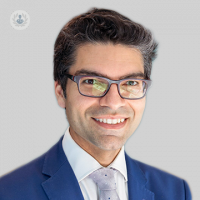Post-bariatric surgery: is it still possible to gain weight?
Written in association with:If you’ve successfully lost a lot of weight after undergoing bariatric surgery, one of your biggest fears may be that you’ll start regaining weight again. And this fear is reasonable; deciding to undergo weight loss surgery is usually the result of years of yo-yo dieting and frustration, so gaining weight again will feel like you are undoing all your hard work.
The good news, however, is that weight gain at this point is very rare, but it's important to know that it can still happen.
Mr Ahmed R Ahmed is one of London’s leading surgeons who routinely performs weight loss surgery for patients in the capital. In this article, he looks at the factors contributing to weight gain after bariatric surgery and what you should be doing to prevent it.

What are the main reasons people gain weight after having weight loss surgery?
Gaining weight after weight loss surgery is very uncommon within the first year providing patients follow the advice and guidance given to them by their doctors. Gaining a little weight back after the first year, however, is not uncommon. The average weight loss for a 100 Kg person in the first year will be 30 Kgs. Studies have shown that if we follow this person over a 20 year period then it is likely that their weight in 20 years' time will be 80 Kg – or in other words, we expect patients to regain about 10% of weight in the long run.
Patients who gain significant weight after weight loss surgery can be due to one of two reasons.
- Structural problems: there might be a problem with the operation, you may have developed a fistula or some other mechanical problem that causes you to gain weight.
- Functional problems: the patient is unknowingly doing things wrong such as snacking or grazing on unhealthy, high-calorie foods; having trouble maintaining lifestyle changes; night eating or emotional eating and not attending regular check-ups.
Is it possible to overeat after receiving a gastric bypass or sleeve?
Yes, it is possible; but it’s difficult. The operation curves your appetite, so you would really need to try hard to overeat.
For example, if you’ve undergone a gastric band, your stomach size is reduced so you would need to force yourself to eat more. If you do manage to overeat though, the likelihood is you will vomit and it will hurt.
However, it is possible to gradually eat more over a long period and stretch your stomach size, which eventually results in needing to eat more food to feel satisfied. It is important to stress here though that this is very uncommon.
What support do you offer patients before and after surgery?
I prepare all my patients for weight loss surgery by giving them all the information they need and inform them of what is expected of them following the surgery.
After the procedure, I offer follow-up appointments that are set up after one week, then three months later, again at 6 and 12 months and then once every year. During these follow-ups, I chat with the patient, carry out blood tests to check their nutritional levels are normal and keep an eye on their progress.
In addition, I refer patients to expert dieticians and psychologists to help advise and support the patient through the process of losing weight if they need it. This support will involve, for example, portion size suggestions, nutrition education, and general guidance and advice.
Do patients need to exercise after bariatric surgery?
We always recommend people take on an exercise programme. While you don’t need to exercise to lose weight, it’s always good to incorporate some physical activity into your lifestyle to support your weight loss and generally lead a healthy lifestyle. Exercise should begin two weeks after surgery.
What should a patient do if they notice they are gaining weight?
They should consult their doctor; however, this should have been picked up anyway during follow up sessions. I weigh all my patients during every appointment and keep a close eye on their progress.
If someone ever starts to notice they are gaining weight after weight loss surgery, the first thing they should do is consult their doctor and find the reasons behind it.
To make an appointment with Mr Ahmed R. Ahmed, visit his Top Doctors profile and check his availability.


